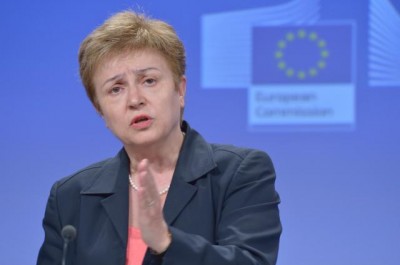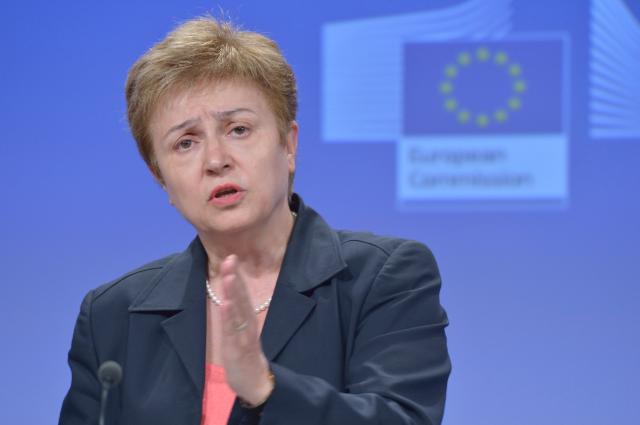The Syrian “madness”

(BRUSSELS2) “ 66% of refugees are children. We cannot turn our backs on this tragedy, we must act now to avoid the loss of an entire generation of young Syrian children ". Kristalina Georgieva, the European commissioner in charge of humanitarian aid, spoke to the press on Tuesday (14 May), after a 3-day trip (Saturday 11 to Monday 13) to Lebanon and Jordan. This is not the first time that the commissioner has sounded the alarm. And we fear that it will not be the last! During her speech, the Commissioner recalled that the number of refugees is exploding and that the resolution of the crisis is still a long way off. She announced additional financial support, particularly to countries hosting refugees. Even if...
A drop of water in the sea
« I knew, when announcing them, that these 65 million euros would only be a drop in the ocean said Georgieva about the additional funds that will be allocated to the situation in Syria pushing up the total amount Commission and Member States "to more than 800 million euros, which makes the EU the main donor ". She notes that since her last trip 4 months ago, “ the answers are more important but that the needs are constantly more important (whatever) in education, health services, water ».
More and more refugees in Lebanon and Jordan, the international community must wake up
The commissioner denounced the suffering of millions of Syrians, most of whom are children, and the ever-increasing pressure on local communities ". He is " crucial " that the " international community wakes up ". The situation in the host countries, Lebanon and Jordan “ has deteriorated further ". The numbers are " extremely alarming: 2000 new refugees every day in Jordan !”. The most important camp in the Zaatari country “ became the 5th city of the country " even though " only 25% of refugees are in camps ". The total for the two countries would be one and a half million refugees, " which represents 10% of the Lebanese and Jordanian populations ". If the stream continues, they could represent “ 20 to 30% of the populations of Lebanon and Jordan. I ask you, which EU member country could accommodate such a wave of refugees ". Added to this are the 5 million internally displaced persons.
Dangerous pressure for host countries
« There is increased competition for housing, jobs, food prices, Lebanese and Jordanians are still welcoming. But there are already conflicts in some places explains the curator. The process seems impossible to circumscribe. " It is extremely difficult to stop this wave of immigration and ask people to return to their country ". The situation is particularly complicated in Lebanon “ it's even worse, because there are already Palestinian refugees. There are also the Palestinians who were in Syria and who are now in unsanitary camps where living conditions are extremely difficult. (sometimes) up to 9 people on 2 m2 ».
To deal with this situation, we must go further, and fund even more. I will speak with my colleagues at the Commission to see how to increase humanitarian aid but also how to support local communities ". Of the 1,5 billion donation pledges collected during the conference organized by Kuwait " very few have been truly invested ».
More targeted sanctions
The Commissioner also came out in favor of measures aimed at " to fine-tune the sanctions regime to allow more humanitarian aid to enter Syria "what Lebanon demands, " our interlocutors tell us that we must continue to help inside the country to prevent the Syrians from leaving their country ". " It is clear that Syria's economy has collapsed » she affirms but « other means are needed to relieve referring to decisions taken on oil in April by the Council of Foreign Ministers.
A Geneva 2 to put an end to the "madness"
Regarding the long-term crisis settlement, Georgieva pleaded for a Geneva 2, “ we must not abandon the idea of a political solution, Lavrov and Kerry discussed the need to set up a Geneva 2, that's all we have the Geneva agreement ". " We welcome any effort to put an end to this madness, I mean this madness ". This pessimistic vision is surely fed by the meetings of the Commissioner on the ground, " the people I talk to don't expect a quick fix, there's so much bloodshed that getting all parties to the negotiating table won't be easy. I met a group of women who have all lost brothers, husbands. And this question of the political solution for them is very difficult because it is difficult to forget »
The grave Syrian “madness” of humanitarian law
Georgieva also called for " pressure both sides to uphold the laws of war. People who work in humanitarian organizations speak of impunity and atrocities and this undermines efforts to build international humanitarian law. We are celebrating 150 years of the Red Cross and at the same time this achievement, built on European deaths, is being destroyed by what is happening before our eyes and this is surely the first priority inside the country. ».

